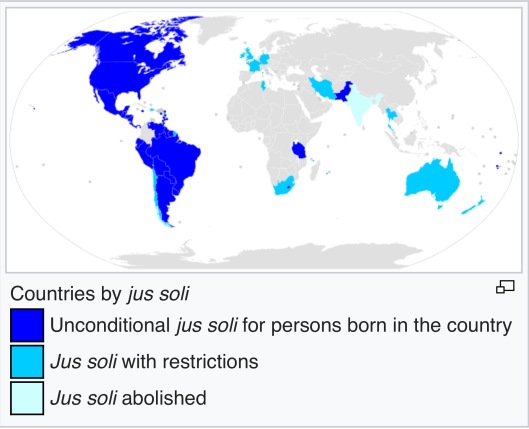Tags
5th column, Anchor babies, birth tourism, Citizenship, citizenship by birth, citizenship by blood, fifth column, immigration, jus sanguinis, jus soli, Miami, overpopulation, population, Russia, Ukraine
As can be seen on the map below, outside of the Americas almost no country allows this insanity:
“Almost all states in Europe, Asia, Africa and Oceania grant citizenship at birth based upon the principle of jus sanguinis (right of blood), in which citizenship is inherited through parents not by birthplace, or a restricted version of jus soli in which citizenship by birthplace is automatic only for the children of certain immigrants.” https://en.wikipedia.org/wiki/Jus_soli

On the other hand, some may have to pay to get rid of the US citizenship, however, if they don’t want to be double taxed. The US wants citizen tax money even if it is someone born in the US but who has never lived there and/or who works abroad: “Unlike most nations, the US taxes non-resident citizens on their worldwide income.” Read: “Boris Johnson among record number to renounce American citizenship“. https://www.theguardian.com/politics/2017/feb/08/boris-johnson-renounces-us-citizenship-record-2016-uk-foreign-secretary
From VOA:
“Miami Is Gaining Popularity As a Major Birth Tourism Destination
April 11, 2018 2:37 AM, by Mariia Prus
Link: http://youtu.be/QG-MNiYeI-k
“(This story originated in VOA’s Russian service.) — Mild climate, warm ocean temperatures, buzzing nightlife – Miami has been a favorite tourist destination for Eastern Europeans for years. But lately, many of those coming to The Sunshine State have been bringing home much more than a beautiful tan, as Russians and Ukrainians come to the city to give birth, so that their babies are US citizens. VOA’s Mariia Prus has more.” https://www.voanews.com/a/4341767.html
An explanation of the issue (extract from Wikipedia):
“Jus soli (English: /dʒʌs ˈsoʊlaɪ/; Latin pronunciation: [juːs ˈsɔ.liː]), meaning “right of the soil”,[1] commonly referred to as birthright citizenship, is the right of anyone born in the territory of a state to nationality or citizenship.[2]
Jus soli was part of the English common law, in contrast to jus sanguinis, which derives from the Roman law that influenced the civil-law systems of continental Europe.[3][4] As an unconditional basis for citizenship, jus soli is the predominant rule in the Americas, but it is rare elsewhere.[5][6] Since the Twenty-seventh Amendment of the Constitution of Ireland was enacted in 2004, no European country grants citizenship based on unconditional jus soli.[7][8]
Almost all states in Europe, Asia, Africa and Oceania grant citizenship at birth based upon the principle of jus sanguinis (right of blood), in which citizenship is inherited through parents not by birthplace, or a restricted version of jus soli in which citizenship by birthplace is automatic only for the children of certain immigrants. Countries that have acceded to the 1961 Convention on the Reduction of Statelessness will grant nationality to otherwise stateless persons who were born on their territory, or on a ship or plane flagged by that country.
Jus soli is associated with permissive citizenship rights. Most countries with unconditional jus soli laws tend to give birthright citizenship (and nationality) based on jus sanguinis rules as well, although these stipulations tend to be more restrictive than in countries that use jus sanguinis as the primary basis for nationality….”
“References
1 . jus soli, definition from merriam-webster.com.
2. Vincent, Andrew (2002). Nationalism and Particularity. Cambridge; New York: Cambridge University Press.
3. Ayelet Shachar, The Birthright Lottery: Citizenship and Global Inequality (Harvard University Press, 2009), p. 120.
4. Rey Koslowski, Migrants and Citizens: Demographic Change in the European State System (Cornell University Press, 2000), p. 77.
5. Rotunda, Ronald D. (16 September 2010). “Birthright citizenship benefits the country”. Chicago Tribune.
6. Smith, Morgan (16 August 2010). “Repeal Birthright Citizenship – and Then What?”. Texas Tribune.
7. Gilbertson, Greta (1 January 2006). “Citizenship in a Globalized World”. Migration Policy Institute.
8. Vink, M.; de Groot, G. R. (2010). Birthright Citizenship: Trends and Regulations in Europe. Comparative Report RSCAS/EUDO-CIT-Comp. 2010/8 (PDF). Florence: EUDO Citizenship Observatory. p. 35…..”
https://en.wikipedia.org/wiki/Jus_soli
Image public domain via Wikipedia
Citizenship by blood: https://en.wikipedia.org/wiki/Jus_sanguinis

You must be logged in to post a comment.